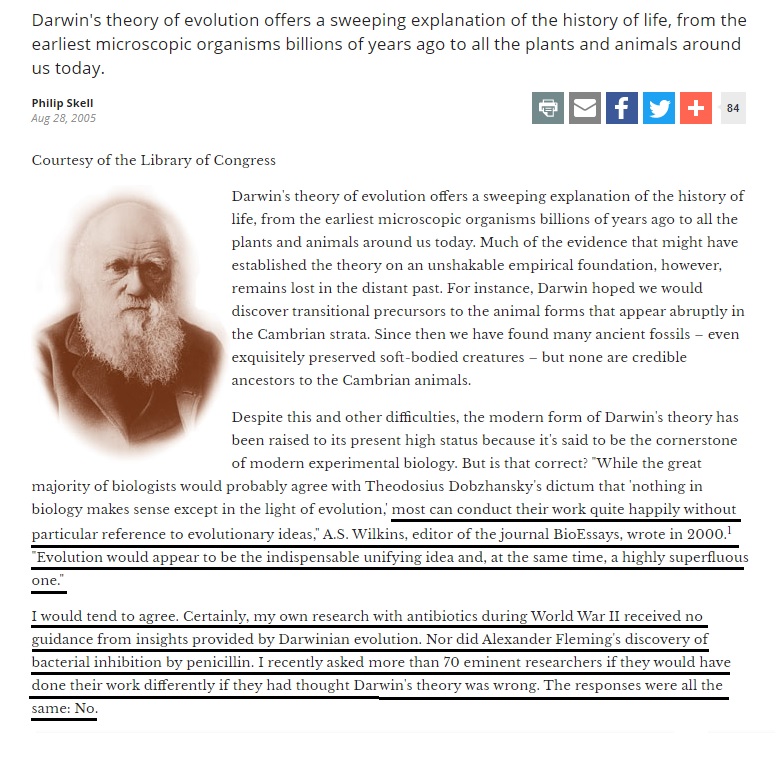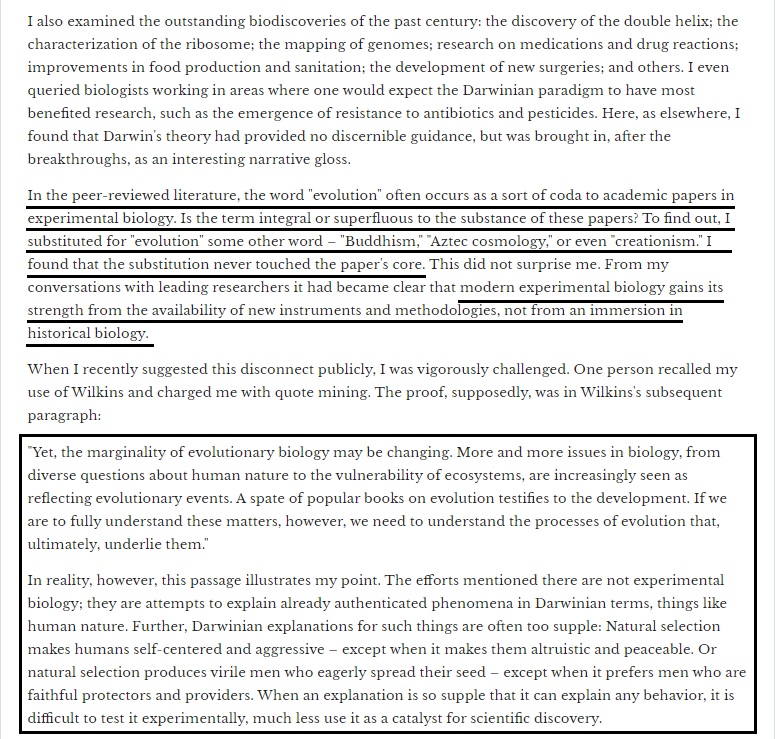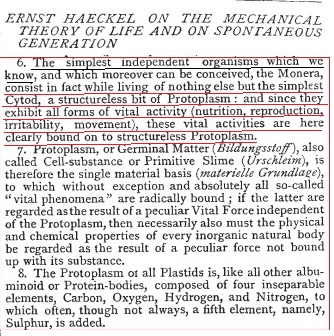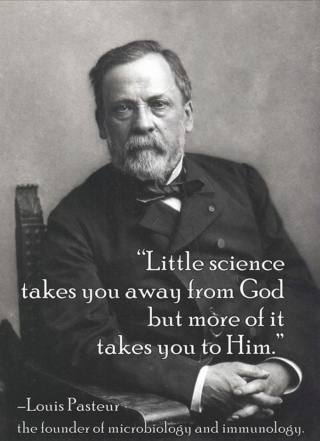https://reasonandscience.catsboard.com/t1647-darwins-theory-did-it-bring-any-good-in-scientific-research
Evolutionary biology contributes nothing to medicine. Comparative biology? Sure. Scientific method? Yep. Information science? Yep. So I'd say everyone who uses these latter methods are more compatible with IDers than Darwiners.
Seriously, Darwinism has only hindered science - ever heard of vestigial organs, phylogeny recapitulates ontogeny, or junk DNA? All bogus, science-inhibiting fictions based largely on Darwinian thinking.
― Philip S. Skell, Why do we invoke Darwin? Evolutionary theory contributes little to experimental biology
“I recently asked more than seventy eminent researchers if they would have done I their work differently if they had thought Darwin's theory was wrong. The responses were all the same: no. I also examined the outstanding biodiscoveries of the past century: the discovery of the double helix; the characterization of the ribosome: the mapping of genomes; research on medications and drug reactions: improvements in food production and sanitation; the development of new surgeries; and others. I even queried biologists working in areas where one would expect the Darwinian paradigm to have most benefited research, such as the emergence of resistance to antibiotics and pesticides. Here, as elsewhere, I found that Darwin's theory had provided no discernible guidance, but was brought in, after the breakthroughs, as an interesting narrative gloss.”
Dr Marc Kirschner, chair of the Department of Systems Biology, Harvard Medical School, stated: “In fact, over the last 100 years, almost all of biology has proceeded independent of evolution, except evolutionary biology itself. Molecular biology, biochemistry, physiology, have not taken evolution into account at all.”9 Dr Skell wrote, “It is our knowledge of how these organisms actually operate, not speculations about how they may have arisen millions of years ago, that is essential to doctors, veterinarians, farmers
Biomimetics
The evidence of the imitation
1. The hard work of the scientists to find and make the complex designs of nature is seeing and imitating the creation of the first creator who already created everything perfectly long time ago.
2. Thus, God the primeval supreme designer most probably exists.
The smart money is on biomimetics, a hot new trend built on intelligent design principles, assuming, as it does, that nature's designs are so good they are worth imitating. If any investors want to send even a small portion of Lonsdale's promised funding to support biomimetics projects or intelligent design organizations, such as Biologic Institute, Discovery Institute or Illustra Media, they can rest assured it won't take 150 years to show some returns.
Darwins Theory, did it bring any good in scientific research ?
http://reasonandscience.heavenforum.org/t1647-darwins-theory-did-it-bring-any-good-in-scientific-research
Daniel Sinclair
Evolutionary biology contributes nothing to medicine. Comparative biology? Sure. Scientific method? Yep. Information science? Yep. So I'd say everyone who uses these latter methods are more compatible with IDers than Darwiners.
Naturalism is stopping more science today than fundamentalism
http://www.uncommondescent.com/genetics/naturalism-is-stopping-more-science-today-than-fundamentalism/
Over at Access Research Network,, David Tyler comments on “Exonic Transcription Factor Binding Directs Codon Choice and Affects Protein Evolution,
Genomes contain both a genetic code specifying amino acids and a regulatory code specifying transcription factor (TF) recognition sequences. We used genomic deoxyribonuclease I footprinting to map nucleotide resolution TF occupancy across the human exome in 81 diverse cell types. We found that ~15% of human codons are dual-use codons (“duons”) that simultaneously specify both amino acids and TF recognition sites. Duons are highly conserved and have shaped protein evolution, and TF-imposed constraint appears to be a major driver of codon usage bias. Conversely, the regulatory code has been selectively depleted of TFs that recognize stop codons. More than 17% of single-nucleotide variants within duons directly alter TF binding. Pervasive dual encoding of amino acid and regulatory information appears to be a fundamental feature of genome evolution. (paywall)
noting
The decision to endorse a naturalistic explanation rather than advance agnosticism about the origins of hidden overlapping codes is a pointer to hidden ideologies in origins-science. It seems that as long as materialism/naturalism is presumed, then a great number of unwarranted assertions (usually linked to Darwinism or abiogenesis) go unchallenged in academic papers. As soon as it is pointed out that only intelligent agents write codes, there is an outcry that science is being subverted by religious fundamentalists. However, the converse is true: intelligent design theory is based on the evidence of complex specified information. The evidences for naturalistic alternatives all evaporate under close scrutiny. More.
Naturalism is stopping more science today than fundamentalism, by forbidding many discussions and making many questions unaskable. By preferring famous fables and long, convoluted just-so stories by definition.
See also: There is nothing “controversial” about materialism = It’s a circus that can’t leave town because all the wagons are milling around in a circle.
http://www.isikansascity.org/notable-inventions-discoveries-developments-by-creationist-scientists.html
"Directed evolution has been successfully used to engineer proteins for basic and applied biological research. However, engineering of novel protein functions by directed evolution remains an overwhelming challenge. "
Translation: can't be done without engineering, i.e. intelligence.
http://www.ncbi.nlm.nih.gov/pubmed/17721862
Credit to: Bill Holbert
With much publicity, the National Academy of Science has launched yet another glossy anti-creationist booklet, Science, Evolution and Creationism (SEC) that claims biological science is based on evolution.
But what about the biology-based science that SEC rightly credits with the vast drop in losses of children to disease? No joy here to the evolutionists either. Many of the most important medical advances were made without the slightest use being made of evolution:
Vaccination was discovered by Edward Jenner (1749–1823—note that Darwin published Origin in 1859)
Antisepsis by Joseph Lister, creationist.(1827–1912)
Anaesthesia by James Young Simpson (1811–1870), who believed that God was the first anaesthetist, citing Genesis 2:21.
Germ theory of disease by Louis Pasteur, creationist (1822–1895), who disproved spontaneous generation, still an evolutionary belief.
Antibiotics, developed without the slightest input of evolution, by the serendipitous discovery by Alexander Fleming (1881–1955), who had previously discovered lysozyme, the ‘body’s own antibiotic’. And Ernst Chain (1906–1979), who shared the 1945 Nobel Prize for Physiology and Medicine with Fleming (and Howard Florey (1898–1968)) for discovering penicillin, was a devout Orthodox Jew and anti-Darwinian. His biography noted ‘Chain’s dismissal of Darwin’s theory of evolution’, and his belief that ‘evolution was not really a part of science, since it was, for the most part, not amenable to experimentation—and he was, and is, by no means alone in this view’. As an understanding of the development of life, Chain said, ‘a very feeble attempt it is, based on such flimsy assumptions, mainly of morphological-anatomical nature that it can hardly be called a theory.’ And speaking of certain evolutionary examples, he exclaimed, ‘I would rather believe in fairies than in such wild speculation.’1
Insulin: its vital function was first discovered by the creationist Nicolae Paulescu (1869–1931), who named it ‘pancreine’. He anticipated the discoveries of Frederick Banting and John Macleod, who were awarded the 1923 Nobel Prize for Medicine for their work on insulin. See Denied the prize.
‘A very feeble attempt it is, based on such flimsy assumptions, mainly of morphological-anatomical nature that it can hardly be called a theory … I would rather believe in fairies than in such wild speculation.’—Ernst Chain, co-winner of 1945 Nobel Prize for discovery of penicillin, on Darwinian evolution
In modern times, we have the outspoken biblical creationist Raymond Damadian (1936–), inventor of the Magnetic Resonance Imaging (MRI) scanner, and Graeme Clark (1935–), the inventor of the Cochlear bionic ear who is a Christian.
Certainly combating the SARS virus was great medical science, but was evolution really necessary? All the science actually found was a virus changing into a virus, which says nothing about how viruses might have evolved into virologists. It also says nothing about how viruses could have originated in the first place. They are incapable of independent reproduction, but are still very sophisticated, including a powerful miniature motor to wind up DNA.
But this whole evolutionary claim is an example of the usual evolutionary fallacy of equivocation, or playing bait-and-switch with the term ‘evolution’: using the term to mean any sort of change, which no creationist doubts, then using evidence for this ‘so-called evolution’ to prove the ‘goo to you via the zoo’ theory, which is what SEC is really all about. The important point is that the latter requires new genes with new information; while most of the ‘proofs’ of evolution in SEC are nothing of the kind. So the ‘evidence’ that SEC adduces for ‘evolution’ cannot be extrapolated for millions of years, since it involves the wrong type of change, in the wrong direction.
The claim that ‘existing infectious agents evolve into new and more dangerous forms’ is also fallacious. Once again, there are a number of ways that virulence could arise that have nothing to do with the changes required to turn germs into gymnasts.
SEC also discusses antibiotic resistance as an example of evolution:
However, natural selection also can have radically different evolutionary effects over different timescales. Over periods of just a few generations (or, in some documented cases, even a single generation), evolution produces relatively small-scale microevolutionary changes in organisms. For example, many disease-causing bacteria have been evolving increased resistance to antibiotics. When a bacterium undergoes a genetic change that increases its ability to resist the effects of an antibiotic, that bacterium can survive and produce more copies of itself while nonresistant bacteria are being killed. Bacteria that cause tuberculosis, meningitis, staph infections, sexually transmitted diseases, and other illnesses have all become serious problems as they have developed resistance to an increasing number of antibiotics.
As usual, we have already shown why antibiotic resistance has nothing to do with bacteria-to-biologists evolution. In most cases, the resistance was already present, and the antibiotic knocks out the non-resistant forms. So there is indeed natural selection, but not evolution.
As SEC says, sometimes a genetic change can cause resistance, but even these changes are akin to scorched earth war, where things the enemy can exploit are destroyed, rather than new machinery arising. E.g. antibiotic resistance is in one sense a war between the germs and the fungi that produce the antibiotic. Sometimes the fungus uses the germ’s own machinery against them—they produce an antibiotic that the germ’s own machines (enzymes) turn into a poison, killing the germ. But if the germ has a mutation that disables the machine, the antibiotic is rendered harmless. But this germ is still disabled, and could not compete with the germs outside the hospital.
Last edited by Otangelo on Thu Jan 13, 2022 7:24 pm; edited 3 times in total







